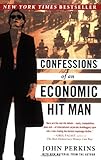This Sebastian Mallaby column from today’s Washington Post really got me thinking. Mallaby writes in response to what he feels are inaccuracies in the book, Confessions of an Economic Hitman, by John Perkins, whom Mallaby calls “a frothing conspiracy theorist, a vainglorious peddler of nonsense.” Full disclosure: I haven’t read the book. Apparently Perkins portrays corporations as evil, omnipotent entities that use bribery, assassination, and seduction to extort tons of money from poor nations. Putting aside the truth or untruth of such a depiction, though, Mallaby’s defense of the corporations seems a little off:
Perkins likes to say that of the world’s 100 biggest economies, 51 are companies. This old chestnut is based on a fallacious comparison of companies’ sales to countries’ gross domestic product
. . .
According to an apples-to-apples comparison done by the United Nations, just two of the world’s top 50 economies were companies in the year 2000. Of the top 100 economies, 29 were companies.
Oh, well and good, as long as it’s only 29. If Mallaby was trying to reassure us that corporations aren’t so big and powerful, color me uncomforted. He anticipates this natural response:
That may still sound like a lot, but remember that companies compete against each other. In the world as Perkins dreams it, the top 100 or so firms are joined in a shadowy conspiracy. But the reality is that Exxon Mobil schemes to undermine BP and Shell, and General Electric plots against Siemens and Hitachi. Countries don’t face a united corporatocracy. They play firms off against each other.
This is leading us to Mallaby’s main (and erroneous, in my opinion) point, but let’s take a brief moment to study that paragraph. While it is certainly true that these companies compete with each other in some areas, there are a few obvious areas where their interests align quite well. Things like oil industry subsidies, or oil exploration friendly legislation, or not mentioning the idea of conservation in your State of the Union speech. Mallaby’s contention, in other words, is not always true, and it is those times it is false that present the danger that Perkins might be referring to. Here’s that main point I referred to:
Besides, power is not the same as sales figures. Governments force citizens to pay taxes; firms can’t force customers to do anything. Governments put citizens behind bars; citizens can use consumer power to put companies out of business. Governments have a monopoly on the right to impose laws, including laws that constrain corporate behavior; the fact that firms spend vast sums on lobbying is proof not only of their strength but also of their vulnerability. Of course, sometimes the lobbyists succeed. But over the past couple of decades, the scope of environmental, health and safety laws has generally expanded.
There are a lot of problematic claims to unpack here. Corporations can’t force customers to do anything unless they can get the government to do it for them. In that context, the assertion that the scandaliferous lobbying is a sign of weakness seems totally ridiculous. And, of course, to refer to the stronger environmental laws, now continually assaulted and weakened by this President, is laughable.
As I said, color me uncomforted. To follow Mallaby’s contentions to their logical conclusions would imply a world where large, wealthy, and powerful corporations could indeed enact all sorts of mischief to the extent that their interests aligned with each other, and to the extent they could find (or purchase) sympathetic ears in the government. Actually, maybe Mallaby was right after all.
Books mentioned in this post:
